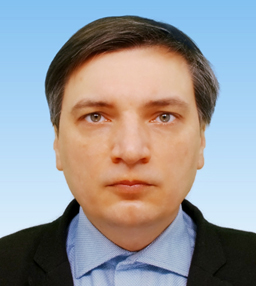
Ihor Datsenko
Specially Appointed Assistant Professor
History of Ukrainian language, Historical Sociolinguistics, Formation of East Slavic Language Standards
Contact: ihor.datsenko@slav.hokudai.ac.jp
Ihor Datsenko
Education:
2004 Specialist degree in Ukrainian Philology, Sumy State Pedagogical University, Ukraine
2008 Candidate of Sciences in Philology, Institute of Ukrainian language, Kyiv, Ukraine
2012 Ph.D., History, University of Vienna, Austria
Field of Study:
I began my university education in a northeastern Ukrainian city of Sumy, studying the Ukrainian linguistics and literature. Later I researched at the NASU Institute of Ukrainian Language in Kyiv, focusing on the structural and historical development of the Ukrainian language. My candidate's dissertation analyzed the historical transposition of prepositional nouns into adverbs. While studying at Vienna University, I learned how the political environment and social thought can influence language development. The Ukrainian language is a prime example for this. It evolved in both Astria and Russia in 19th century, but because Austria had more liberal policies, it became more widely recognized. In Russia, however, it faced restrictions.
After finishing my Ph. D. thesis, I choose to concentrate on the formation of the standard version of the Ukrainian language. I examined how 19th-century Ukrainian intellectuals worked creating literary language. Understanding the evolution of the all-Ukrainian language standard in the early 20th century, shaped by Western and Eastern Ukrainian traditions, is crucial as its standard remains controversial among Ukrainian society and among linguists. My recent research investigates the Russian language’s impact and the Soviet Union's political ideology on the Ukrainian language development in the 20th century, emphasizing the connection to the war in Ukraine. The language issue has been used as a political instrument, especially in regions occupied by Russia in 2014 and 2022, where Russian influence grew significantly during the Soviet era.
Recent Publications (Selected):
Monograph:The history of forming of the adverbs of place. Kyiv: D. Buraho Publishing House, 2014 (in Ukrainian)
Articles:
“Against the Ban of Language: Ukrainian Intellectuals’ Collaboration under Two Empires”. M. Akao and Y. Harada (ed.), The Challenge of Ukrainian Culture: Beyond the Turbulent Times, Tokyo: Gengishobo, 2025 (in print) (in Japanese).
“Ukrainian Orthography”. M. L. Greenberg (ed.), Encyclopedia of Slavic Languages and Linguistics Online. Brill. (co-author: A. Danylenko; in print)
“Ukrainian in the Eastern Liturgy: Between Church Slavonic and Vernacular”. Slavic Studies Review, 2025, no. 28 (in Japanese)
“On the Subjectivity of Ukrainian in Joseph Levicky's "A Grammar of the Ruthenian or Little Russian Language in Galicia" (1834)”. Chukyo University Social Science Research, 2024, vol. 44, no. 2 (in Japanese)
Book Chapters:
“The Northeastern Region as the Cradle of Ukrainian Culture: Siverščyna, Slobožanščyna, and Poltavščyna (transl. by Y. Harada)”. M. Hattori and Y. Harada (ed.), Introducing Ukraine in 65 Chapters, Tokyo: Akashi Shoten, 2018 (in Japanese)
“Ethnic and Linguistic Composition: From Slavic, Germanic, and Romance to Turkic (transl. by Y. Harada)”. M. Hattori and Y. Harada (ed.), Introducing Ukraine in 65 Chapters, Tokyo: Akashi Shoten, 2018 (in Japanese)
Book reviews:
Michael Moser. “Юности честное зерцало” 1717 г. У истоков русского литературного языка. Wien: Lit, 2020, 454 S. Acta Slavica Iaponica, 2022, no. 43 (in Russian)
Danylenko Andrii. From the Bible to Shakespeare. Pantelejmon Kuliš (1819-1897) and the Formation of Literary Ukrainian. (Boston: Academic Studies Press, 2016, 447 pp.) Slavic Studies Review, 2025, no. 28 (in Russian)